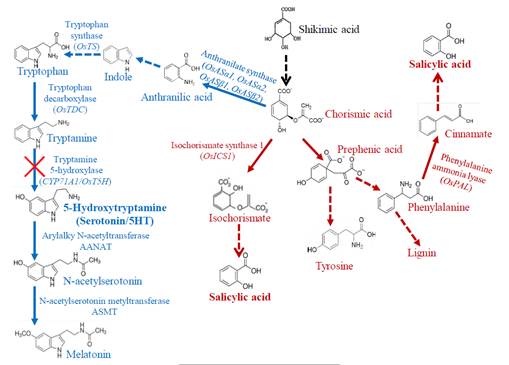

五羟色胺是一种让人的大脑产生愉悦感的化合物,浙江大学农学院舒庆尧及其合作者最新研究发现:害虫也喜欢五羟色胺。害虫啃食水稻时,植株体内的五羟色胺含量会增加,对害虫来说,这使水稻的“口感”和“营养”都提升了。
据了解,这是科学界第一次揭示五羟色胺与水稻抗虫性之间的关系,将对下一步培养更优抗性的水稻和发展防虫治虫策略提供新的思路。
褐飞虱和螟虫是稻田中两种破坏性最大的害虫。浙江大学昆虫所的娄永根教授长期关注植物化合物与昆虫的互动机制,他发现在遭到害虫侵害时,植物机体会分泌出不同的化学物质。
通过研究发现,害虫在侵食水稻时,水稻体内的五羟色胺含量升高了。它主要由一个叫CYP71A1的基因合成。“当害虫侵食水稻时,这个合成五羟色胺的‘开关’就被打开了。”舒庆尧说。
为了探究五羟色胺对害虫的影响,博士生罗婷开始了“数虫子”工作:数出15只褐飞虱,放到装有两株水稻的容器中:一株水稻是自然野生型水稻,另一株是敲除了CYP71A1基因的水稻。
“我们发现一个很有趣的现象:刚开始分布均匀的褐飞虱,一段时间后会表现出明显的分离。”罗婷说,大部分褐飞虱选择去自然野生型水稻。
显然,被敲除了CYP71A1基因的水稻被害虫“嫌弃”了。原因则是无法调高五羟色胺的分泌。
令科学家好奇的是:害虫为什么喜欢五羟色胺?
研究发现,摄入更多的五羟色胺之后,虫子的生长发育加快了,身躯也更加“壮硕”了,这在螟虫的身上表现得特别明显。“虫子很聪明,它不但懂得‘吃’,还能把食物变得更加‘营养美味’。”舒庆尧说,这是害虫的智慧。
这一发现对提高水稻的抗性,维护粮食产量和品质有很重要的科学价值。
科研团队进一步探究发现,在植物体内,五羟色胺和水杨酸的合成有一个共同的源头物质——分支酸,水杨酸是一种已知的能够提高水稻抗病性的化合物。
论文第一作者芦海平博士介绍,五羟色胺和水杨酸合成过程存在相互负调控,本身又可以主动抑制对方合成基因的活性,如水杨酸可以抑制CYP71A1基因的开启,从而减少五羟色胺的含量。
简单来说,当害虫啃食水稻致五羟色胺增加时,原本帮助抗病的水杨酸就减少了。
舒庆尧介绍,很多植物中都存在五羟色胺和水杨酸合成代谢通路,这项研究将对水稻及其它作物的抗虫育种带来启发意义。
相关论文《基于五羟色胺生物合成抑制的水稻抗虫性》日前发表在《Nature Plants》杂志上。(来源:科技日报 江耘 周炜)
Resistance of rice to insect pests mediated by suppression of serotonin biosynthesis
Abstract Rice is one of the world’s most important foods, but its production suffers from insect pests, causing losses of billions of dollars, and extensive use of environmentally damaging pesticides for their control1,2. However, the molecular mechanisms of insect resistance remain elusive. Although a few resistance genes for planthopper have been cloned, no rice germplasm is resistant to stem borers. Here, we report that biosynthesis of serotonin, a neurotransmitter in mammals3, is induced by insect infestation in rice, and its suppression confers resistance to planthoppers and stem borers, the two most destructive pests of rice2. Serotonin and salicylic acid derive from chorismate4. In rice, the cytochrome P450 gene CYP71A1 encodes tryptamine 5-hydroxylase, which catalyses conversion of tryptamine to serotonin5. In susceptible wild-type rice, planthopper feeding induces biosynthesis of serotonin and salicylic acid, whereas in mutants with an inactivated CYP71A1 gene, no serotonin is produced, salicylic acid levels are higher and plants are more insect resistant. The addition of serotonin to the resistant rice mutant and other brown planthopper-resistant genotypes results in a loss of insect resistance. Similarly, serotonin supplementation in artificial diet enhances the performance of both insects. These insights demonstrate that regulation of serotonin biosynthesis plays an important role in defence, and may prove valuable for breeding insect-resistant cultivars of rice and other cereal crops.
原文链接:http://www.nature.com/articles/s41477-018-0152-7



